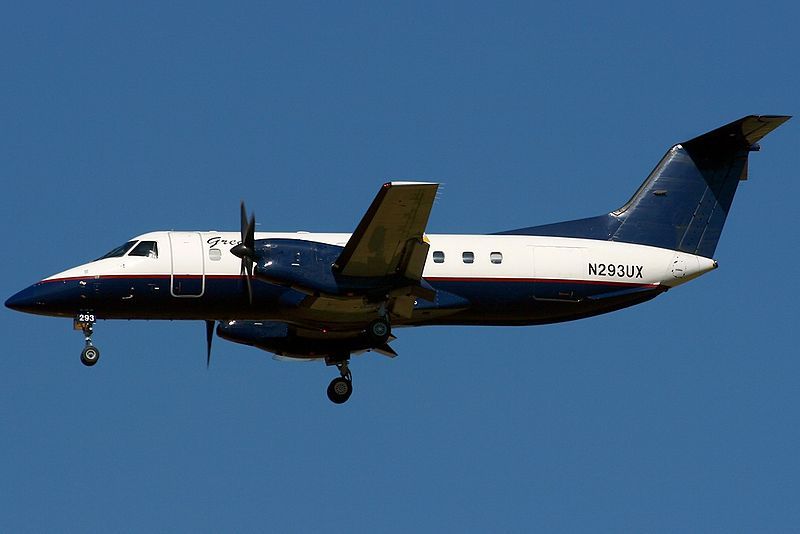Some information may be outdated.
With few options in front of them, the Grand County Council’s members voted unanimously on Feb. 3 to recommend beleaguered Great Lakes Aviation as Moab’s Essential Air Service carrier.
The council will send its recommendation to the U.S. Department of Transportation, which will make the final decision.
“Our options are limited at this time,” Grand County Council chair Elizabeth Tubbs told the Moab Sun News. “Great Lakes was the only bidder from a commercial (airline), versus a charter airline.”
Great Lakes has already served as Moab’s Essential Air Service carrier twice before. The last time was from 2012 to 2014, when the company earned a reputation for unreliability and canceled flights. Great Lakes lost its bid for renewal in 2013 to SkyWest Airlines.
Redtail Aviation of Moab and San Francisco-based Boutique Air also bid on the latest two-year contract, but the Grand County Airport Board unanimously supported Great Lakes’ proposal.
Tubbs said that the number of people flying in and out of Canyonlands Field has risen considerably over the past year, and that charter airlines may not be able to handle the increase.
“The charter airlines who applied have provided excellent service and one of them has worked out of our airport for some time,” Tubbs said. “The issue has more to do with the size of the planes and the number of passengers they can carry.”
The Great Lakes proposal is for twice-daily, direct service to and from Denver. It plans to use 30-seat airplanes, as opposed to the-19 seat aircraft it operated the last time it held the contract.
Redtail and Boutique both proposed operating a charter service to Salt Lake City using nine-seat airplanes; Redtail’s proposal also included plans for two trips per week between Canyonlands Field and an airport near Las Vegas.
Tubbs acknowledged that more people preferred connections to Salt Lake, but that only the smaller charter airlines were offering that option.
Redtail Aviation owner Mark Francis said he felt that his company could have provided a reliable service that was “uniquely Moab,” but that he understood the council’s decision to recommend Great Lakes.
“They want the larger aircraft to mean more passengers for our airport,” Francis said. “SkyWest was on a great trend and I hope that if Great Lakes gets the bid that they are able to perform at that level.”
SkyWest earned rave reviews from passengers and local officials. But on Nov. 30, the company announced it would be terminating its Essential Air Service contract due to a corporate decision to phase out its fleet of 30-seat turboprop planes in favor of 50-seat regional jets.
The existing runway at Canyonlands Field is too small to accommodate the larger jets, but the county is currently fast-tracking funds to upgrade it.
Grand County Airport Board chair Bill Groff said that Great Lakes has learned a lot from SkyWest’s success.
He said that as part of its commitment to improving service and increasing enplanements, Great Lakes has been negotiating with SkyWest to purchase its 30-seat Embraer EMB-120 Brasilia airplanes.
“They’ve seen what the potential here is,” Groff said.
In a letter to the DOT, Grand County resident Sue deVall expressed her distaste for Great Lakes, as well as her preference for a connection to Salt Lake.
“Great Lakes Airlines has done no favors for the people flying in and out of Moab,” deVall said. “They had a wretched record of cancellation and flight delays when they previously had the contract here. Our community would be better served if flights went to Salt Lake City, our state capitol.”
Airport manager Judd Hill said there were several factors that contributed to Great Lakes reliability issues, the first of which was its scheduling.
“We were just an intermediate stop,” Hill said. “Now we are the nonstop destination.”
Hill also said that early morning flights were often held up by fog, which prevented planes from being able to land or take off. He said that the new proposed schedule had flights mid-morning and mid afternoon, and that would alleviate many of the problems.
In addition, Hill said that new federal regulations created a pilot shortage, and that Great Lakes suffered heavily under the new requirements.
“Great Lakes went from 300 pilots to 110 overnight when the new rules went into effect,” he said.
Groff said now that the recommendation has gone to the Department of Transportation, it will take close to two months to finalize a decision; he anticipates that the agency will award a new contract by April 1. He noted that the DOT is not bound to honor the council’s recommendation, and that public comment was still being accepted through Feb. 19.
Hill said he believed Great Lakes was demonstrating a will to provide better service. It has made good-faith efforts through its scheduling changes and through its commitment to provide larger aircraft, he said.
“You don’t promise the varsity team when you can just send in the junior varsity,” Hill said.
Groff also expressed optimism.
“They will do everything they can if awarded the contract,” Groff said. “They know they aren’t in very good standing here.”
Recommendation comes despite concerns about past track record
They will do everything they can if awarded the contract … They know they aren’t in very good standing here.
Great Lakes Aviation could not be reached for comment by press time this week.
Appreciate the coverage? Help keep local news alive.
Chip in to support the Moab Sun News.





